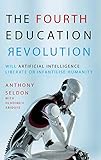The fourth education revolution : will artificial intelligence liberate or infantilise humanity? / Anthony Seldon with Oladimeji Abidoye.
Publisher: [Buckingham] : University of Buckingham Press, 2018Description: 353 pages : illustrations (black and white).Content type: text Media type: unmediated Carrier type: volumeISBN: 9781908684950.Subject(s): Education -- History| Item type | Current library | Class number | Status | Date due | Barcode | |
|---|---|---|---|---|---|---|
| Book | Millbank Dewey | 006.3071 SEL (Browse shelf(Opens below)) | Available | 016282 |
Introduction: education, the CInderella of the AI story -- 1. The first three education revolutions -- 2. What is education? What is an educated person? -- 3. Five intractable problems with conventional education -- 4. What is intelligence? The narrow vision of the factory era -- 5. What is AI and what is its history? -- 6. The state of AI in the USA and the UK -- 7. The future of AI in schools -- 8. Universities of the future -- 9. The benefits, opportunities and risks of AI in education -- 10. Will AI liberate or infantilise humanity?
"There is no more important issue facing education, or humanity at large, than the fast approaching revolution in Artificial Intelligence or AI. This book is a call to educators everywhere to open their eyes to what is coming. If we do so, then the future will be shaped by us in the interests of humanity as a whole - but if we don’t then it will be imposed by others.
Britain and the US have an excellent education system in their schools and universities - excellent, but tailored to the twentieth century. The factory mass teaching methods of the third revolution era have failed to conquer enduring problems of inequity and unfairness. Students have to make progress at a set rate which demotivates some and bores others. And for all the new technologies, teachers remain weighed down by routine administration and only a narrow range of our aptitudes are encouraged. Will the fourth AI revolution be able to remedy these problems? We have allowed ourselves to believe that teaching can uniquely be done only by the teacher, but might it in fact be better carried out by AI machines? Or at least in concert with teachers?
The evolution of AI, still in its infancy, raises a range of issues of enormous importance as we grapple how we as humans will interact with it. AI will be an altogether new way spreading quality education across the world especially to those hundreds of millions who do not have it. And coming it is - the final part of the book stresses that we have to embrace AI and ensure that we shape it to the best advantage of humanity. If we get it wrong, there may be no second opportunity.
The conclusion....
"nothing matters more than education if we are to see AI liberate not infantilise humanity."" -- University of Buckingham Press site.
